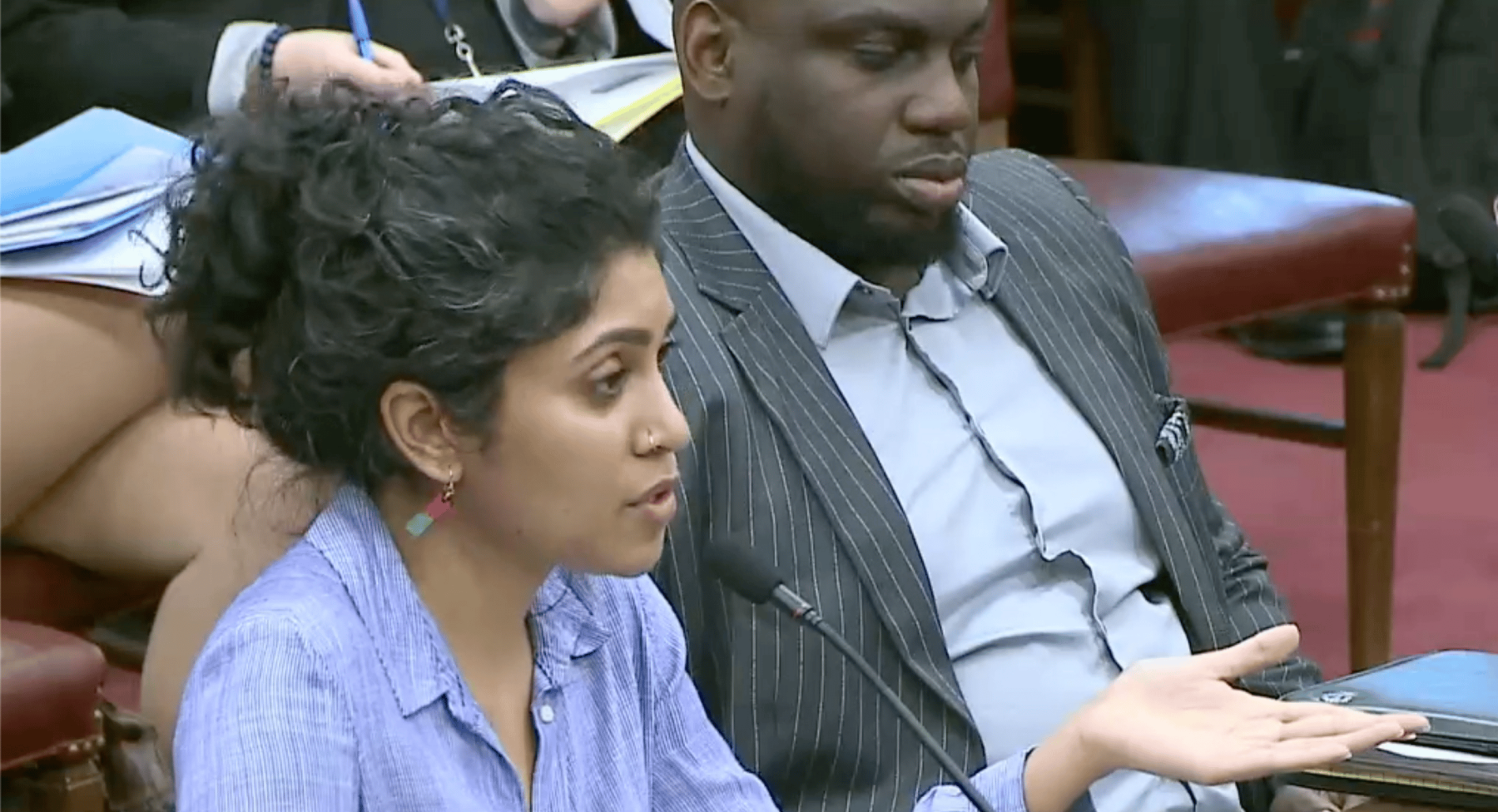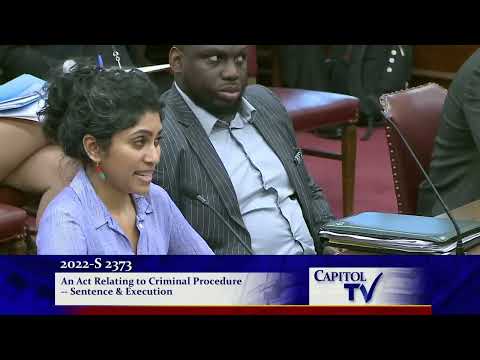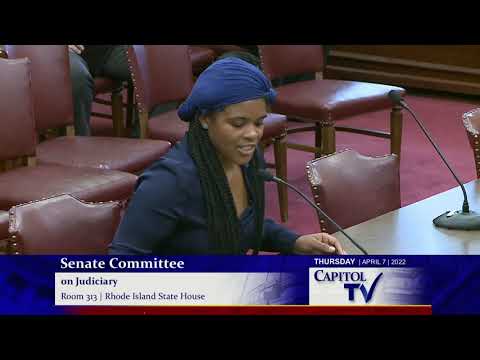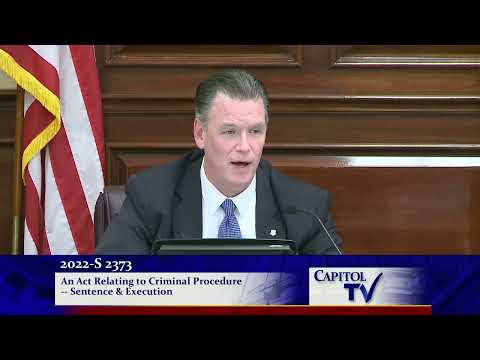An interview with DARE organizer Anusha Alles on racism in the RI General Assembly
“Our people are used to being in settings where they’re not being believed, where they’re not given an opportunity to speak, they’re not being given an opportunity to be heard,” said DARE Organizer Anusha Alles. “That’s such a common experience for our folks because of the court system and because of everything that they do within the court system…”
April 22, 2022, 11:26 am
By Steve Ahlquist
On Wednesday UpriseRI published an analysis of recent RI House Judiciary Committee meetings that demonstrated how the concerns of white, middle and upper class voters are prioritized over the concerns of low-income people and people of color through systems and procedures intentionally created to suppress their voices.
On Thursday Uprise RI spoke with Anusha Alles, an organizer with Direct Action for Rights and Equality (DARE) who has experienced the impacts of these systems and procedures directly. Alles organized to bring members of the community to the State House on April 7 and April 13 to testify before the Senate and House Judiciary Committees on S2373/H7887, a bill drafted by DARE and submitted on their behalf that would “require the setting of bail for defendants coming before the court as alleged probation violators.”
In the House Judiciary committee, their bill was not heard until around 1am.
Members of DARE were also in the committee rooms to advocate for other bills as well, including one to limit the use of solitary confinement at the Adult Correctional Institutions (ACI) in Cranston. At that hearing Patricia Coyne-Fague, the director of the Rhode Island Department of Corrections, testified strongly in favor of solitary confinement.
I also spoke to Alles because at the Senate Judiciary Committee, Senator Stephen Archambault (Democrat, District 22, Smithfield, Johnston, North Providence) repeatedly and condescendingly responded to the testimony of people who are on probation, citing his own expertise in the criminal justice system (as a former police officer and current lawyer) and repeatedly dismissed the testimony of those speaking from their own personal experience. His exchange with Alles was remarkably condescending, and Archambault was aided in abusing Alles by Senator Cynthia Armour Coyne (Democrat, District 32, Barrington), who chairs the committee and by Senator Frank Lombardi (Democrat, District 26, Cranston). You can watch the exchange here:
You can watch the full Senate Judiciary Committee hearing on S2373 here:
Here’s the interview:
UpriseRI: What I really want to get at with you today is what the cost of testifying before committees at the State House is to organizers and people in the community who are concerned about an issue, do a monumental amount of work to prepare to go to the State House and then their bills are left to the end of the hearing and nothing ever comes of it. Can you tell me about what it’s like to prepare for a public hearing and what that entails?
Anusha Alles: It’s a stressful process because first of all, you don’t get that much notice. You don’t know when your bill is going to come up. So we start preparing weeks in advance. We start preparing info sheets, we start lining up people to testify. But there has to be some level of flexibility around it because people don’t know their work schedules. People don’t know because we don’t know the date. It’s very hard to prepare. We have to actually line up more people than we need because we have to count on the fact that some of those people are not going to be able to make it. Then, once it gets scheduled, we have a few days to prepare. We meet with everybody, we talk about what the main points are. For a lot of folks it’s their first time speaking in public.
It also it brings a lot of anxiety for a lot of our members because you’re in a room full of white people. It’s really like a courtroom as well. The Senate Judiciary Committee hearing in particular – they’re all sitting up higher up, at a higher level, you know, physically on a higher level than the people who are speaking. Knowing that the elected officials don’t like the people – our members – the people who are speaking, our folks whose voices never get heard – and it’s very deliberate. Our people are used to being in settings where they’re not being believed, where they’re not given an opportunity to speak, they’re not being given an opportunity to be heard.
That’s such a common experience for our folks because of the court system and because of everything that they do within the court system. So public speaking and having to speak in front of this committee of people who may or may not be receptive to what they’re saying – most likely will not be receptive, actually – is really stressful.
Then there’s all the emotional preparation. Organizing with folks is often just getting people emotionally prepared, letting folks know what it’s going to be like when you go to the State House – there are going to be metal detectors at the front, there are going to be police at the front and you’re going to have to go through that. You have to be prepared to stay all night. That’s the other thing, letting folks know, even with all this preparation you’re doing, you may not even get a chance to speak. Preparing folks for that because it’s incredibly frustrating for people. Preparing people to share personal stories that are sometimes really traumatic.
We had somebody who was supposed to speak at a Senate hearing, and at the last minute he pulled out because he was he was really, really triggered and anxious about having a speak in front of these people. And I was so grateful afterwards that he did pull out, because I think the experience would have been terrible for him.
That’s like a piece of it that doesn’t always get seen. It’s emotional labor for people to go and that people subject themselves to in order to go and testify. It’s a really it’s a big experience for people.
UpriseRI: One thing I noticed in the past when I was covering other meetings and other issues was the economic cost of missing a shift. Because you take time off or rearrange your work schedule – or securing day care or bringing your kids with you. Do people talk to you about that at all?
Anusha Alles: Usually with our folks, if people have work or they have childcare responsibilities, they usually are not going to testify. That’s the other piece of this and that’s one of the ways in which this process is so inaccessible. People don’t have the time. And the people who make the time make sure that their work schedule is going to work out for them to be at the State House. We always try to warn people that this might be all for nothing. You might be doing all of this and, the way that the State House works, you might not even get a chance at those measly two minutes to speak.
UpriseRI: That’s another thing. I’ve noticed that when they hold the bills that communities are interested in until the very end, it’s usually very late. And at that point, the legislators are saying, “Hey, because it’s getting so late, we’re going to start limiting testimony even more. We’re not going to allow you to talk for as long as you want or even or three minutes. We’re cutting down to two minutes because we want to get through this.” And then they act like this was unforeseen – that they’re in this position through no fault of their own – but they put 30 bills on the agenda for one night. They knew this was going to happen. And they also knew that by holding bills important to your communities to the end of the hearing that your community was going to be severely limited in the length of their testimony.
Anusha Alles: Right, because they have everybody sign up at 4:30, right? They look at the list of people. They can see that there’s a large group of people waiting to speak on a certain bill, and then on top of that, they’re allowing people on the first few bills nearly unlimited time to speak. I think the first bill that was heard they gave around an hour for one person to speak.
It’s partly about which bills they hear first, but it’s also about who speaks and for how long. They’ll let people from the Department of Corrections get an hour to speak – I’ve been in a hearing where they had a police officer speak and he got over over five minutes while the rest of us were being promptly cut off at two minutes.
THey don’t make it transparent so it looks arbitrary, but it’s it’s not. When you look at who is getting to speak, look at the race of the speakers, the status of the speakers. It’s very clear that it’s not arbitrary.
UpriseRI: The people you’re representing, they understand the racial bias at work, right? They see it clearly.
Anusha Alles: Oh, definitely. I mean, it’s obvious. It’s in your body, right? You walk into a room full of white people, you feel that. it’s what I was saying about how so many people have already experienced this over and over again in a courthouse. That’s a visceral feeling.
UpriseRI: Last Wednesday night at the House Judiciary meeting, money and time was invested. Pizza was delivered [courtesy of Open Doors RI] and I saw art being set up where people were waiting to testify in the Bell Room. By 11 o’clock everybody had left. What was your reaction? Because there were at least six or seven bills people wanted to testify on that weren’t even introduced until past 11pm. Was anybody able to testify and what was that experience like for people?
Anusha Alles: All of our directly impacted members had to leave by the time our bill came up. Our probation reform bill – that we drafted and submitted – didn’t even come up until 1:00 in the morning. At that point, all of our members had left, except for two people who I’m really grateful to for staying. They were two allies from other organizations who spoke in support of our bill. But all of our our committee members who are impacted by this bill, they had all left by then.
UpriseRI: Also, by that time there I think six committee members still in attendance, out of the 15 legislators assigned to that committee. Even the majority of legislators had given up on the process by that time.
Anusha Alles: And I’m sure those that stayed were half asleep as well. I’ve testified at the State House around 11 o’clock and even at 11 o’clock people are exhausted and not paying any attention at that point.
UpriseRI: Right. I hear from the various committee chairs that the public is always welcome to submit written testimony and that the written testimony is read by every member. But I can tell from how unfamiliar these legislators are with the issues at hand that they haven’t read anything submitted. What does that say to you when you hear that written testimony is just as good as verbal testimony?
Anusha Alles: It’s just obviously not the same. I think we all know that. When you talk to somebody face to face and hear their story, their opinion, hear it in their voice, it has a different impact. And what would be the point of even having a public hearing if all we have to do is submit written testimony? With written testimony there’s no opportunity to go back and forth and engage, to answer questions. And written testimony is less accessible for people in certain ways as well. Not everybody feels comfortable sending in written testimony. Some people would rather speak.
UpriseRI: If rich people and big businesses are willing to spend thousands and even hundreds of thousands of dollars to send lobbyists into the State house to speak in person, then obviously written testimony isn’t as good, right? If having lobbyists talk to legislators in person didn’t work better than a written letter, why would people pay for lobbyists?
UpriseRI: Is there anything I should be asking or is there any thing that I didn’t touch on that I’m blind to? Is there more to this that I should understand?
Anusha Alles: The other piece of it is that the way the committee members respond to people – like the way Senator Archambault was speaking to people during a recent Senate Judiciary Committee hearing. It was so disrespectful, so condescending, so paternalistic. It was incredibly racist and classist for him to sit up there and say that he knows the system better than anyone else when he’s in a room full of people who have been in and out of the system – experiencing it for their entire life, from young adulthood to adulthood. It was incredibly arrogant. It felt like such an abuse of power.
And again, the way he’s positioned physically above people – the way they have the ability to tell people to shut up while they get to go on and on as long as they want. The fact that every time somebody testified, Senator Archambault offered counter testimony. Every time he spoke, he offered counter testimony. Our testimony isn’t heard, it’s used as an opportunity for Senator Archambault to be heard. It’s not it’s not about engaging, it’s not about listening. There was no real back and forth. When I attempted to have back and forth, I was promptly shut down. He didn’t listen to anything I said.
The thing that made me angry was is the way he was speaking to our members. One of our members spoke about how being on probation impacts them, knowing that they’re working so hard, going to school, doing everything they can to turn their life around, but knowing that at any minute, they can get targeted. And they are getting stopped constantly, they’re getting stopped by police, constantly being profiled. For Archambault to sit up there and say, “Nobody gets locked up for no reason” – It’s just incredibly ignorant. There’s really no excuse for making a statement like that at this point. Everybody knows that it’s not true. It’s been thoroughly researched and established. There’s so much information out there on that.
Anusha Alles: We also had people in the room saying, “This happened to me.” We had people in the room testifying, saying “This happened to me personally.” And for him to be still upholding the same kind of language over and over again it just points to the racism around how knowledge gets produced and what kind of knowledge gets valued. And then for him to tell one of the people testifying that they’re an exception, that most people on probation aren’t working hard, that they aren’t trying to get stable jobs and go to school or improve their lives – for him to say that is just so offensive. It’s offensive and dismissive and so condescending. It was offensive to everybody sitting in that room because we had several other people in that room on probation.
UpriseRI: Thank you, Anusha, for your time.









